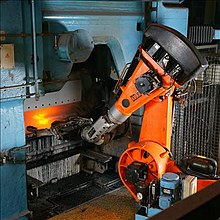 "Far less attention has been paid to the flip side of the jobless recovery: the remarkable improvement in American productivity. How long can this continue? “I see no limit,” says William Hickey, the boss of Sealed Air, a packaging-maker. Is he right to be so optimistic?"
"Far less attention has been paid to the flip side of the jobless recovery: the remarkable improvement in American productivity. How long can this continue? “I see no limit,” says William Hickey, the boss of Sealed Air, a packaging-maker. Is he right to be so optimistic?"At a high level labor productivity is defined as the output per hour. But this productivity during the economically difficult times have come as a result of "First, workers are terrified of losing their jobs. This makes it easier to persuade them to put in extra hours or shoulder new tasks. Even in unionised firms, there have been reports of greater flexibility. Workers have been staying on the job longer rather than “featherbedding” their hours by, for example, queuing up early to clock off as soon as the shift ends."
It is difficult to find a global company today where the stress is not high all the way down to the lowest levels.
Interestingly, the CEO of the corporations may find it lonely at the top, but according to Jennifer Lerner on the research team at Harvard which studied middle to high level officials from government, the military, business and nonprofits, states that the executive levels don't feel stressed or much less so than middle management. Read details here.
The Economist article gives a second reason, "... tough times are forcing firms to strain every brain cell to become more efficient."
Can this be sustained,specifically in light of a global push to compete among the emerging countries for the same opportunity? "But all such advantages are temporary. As Mr Hickey points out, a factory that Sealed Air opened in Mexico was expected to be far less productive than one in America, but within four years had caught up."

No comments:
Post a Comment